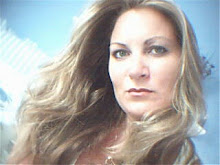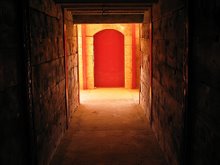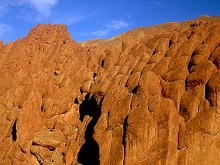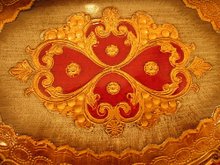It must have been intuition.... that, or just extremely good luck. Either way you look at it, I couldn't have chosen a better day to "do Munich." Although I had a rude start (thanks to two German backpackers who, after insisting on an open window through the night despite drizzly rain and cold drafts, woke before the crack of dawn and chattered loudly as they shuffled from dorm bed to shower stall to, thankfully, the front door), the day soon redeemed itself.
 Map in hand, I followed Lindwurm- strasse towards the town center, passing a medieval-ages-old stone arch and busy street corner lined with fish markets and wine-tasting booths. Workers were wetting up shop, arranging their displays of fresh meats, gleaming bottles, and other tasty treats to entice early-morning passersby. I was on the lookout, however, for a bread shop, and I found one, much to my satisfaction, right across the street from a nondescript church from which a large number of tourists seemed to be streaming.
Map in hand, I followed Lindwurm- strasse towards the town center, passing a medieval-ages-old stone arch and busy street corner lined with fish markets and wine-tasting booths. Workers were wetting up shop, arranging their displays of fresh meats, gleaming bottles, and other tasty treats to entice early-morning passersby. I was on the lookout, however, for a bread shop, and I found one, much to my satisfaction, right across the street from a nondescript church from which a large number of tourists seemed to be streaming.Deciding to take a look, I entered the chapel to find a gleaming gold ceiling, ornately decorated with angels and celestial beings, perfectly reflected in a horizontal mirror which nearly encompassed the whole of the chapel itself. From the far end of the chapel, facing the main entry, light filtered through golden stained glass, falling onto the mirror like a bright halo encircling the silhouettes of the throngs entering and exiting the front doors. It was a brilliant sight -- an unexpected treasure.
 As I neared Marien- platz, Munich´s main square, the clouds dissolved and the sky transformed itself to a deep blue. The famous Rathaus (new town hall) and adjoining Glockenspiel glimmered in the sunlight. I bought a carton of fresh strawberries from a nearby produce stand and enjoyed a few as I waited for the Glockenspeil to begin its first performance of the day, a music-box-like dance of 18 figurines acting out the wedding festival of Renata Von Lothringen and Wilhelm V.
As I neared Marien- platz, Munich´s main square, the clouds dissolved and the sky transformed itself to a deep blue. The famous Rathaus (new town hall) and adjoining Glockenspiel glimmered in the sunlight. I bought a carton of fresh strawberries from a nearby produce stand and enjoyed a few as I waited for the Glockenspeil to begin its first performance of the day, a music-box-like dance of 18 figurines acting out the wedding festival of Renata Von Lothringen and Wilhelm V.Those names mean little to most, but for Bavarians, Wilhelm is renowned as the founder of the Hofbrau brewery. (And if there is one thing Munich is known for, it´s beer! Munich is home to the world´s largest folk festival, Oktoberfest, which is a 16-day drunken, beer-guzzling party that started eons ago as a wedding celebration... but my guess is that weddings have little, if anything, to do with the reason throngs descent on Munich from mid-September to early October). And even were it not for Oktoberfest, Munich remains the beer-drinking capital of the world. In fact, I read somewhere that locals drink on average 350L of beer per years -- if my calculations are correct, that´s the equivalent of 8 cups a day...
 So it was no surprise -- although it was a great treat! -- when a beer- themed parade marched trhough Marienplatz just minutes later. Horse carriages loaded with barrels of local brew kept tempo with brass bands, players dressed in leiderhosen. Young boys and girls, fresh flowers in their hair, followed suit, and a jester zigzagged through the crowds, smudging black soot on the noses of surprised onlookers. I was one of them! The whole thing was over before I knew it, and I relocated myself to the Glockenspiel, awaiting what I already knew would be an overrated performance (15 minutes of wooden figures sword-fighting in slo-mo is a bit much, even for hard-core cuckoo-clock enthusiasts).
So it was no surprise -- although it was a great treat! -- when a beer- themed parade marched trhough Marienplatz just minutes later. Horse carriages loaded with barrels of local brew kept tempo with brass bands, players dressed in leiderhosen. Young boys and girls, fresh flowers in their hair, followed suit, and a jester zigzagged through the crowds, smudging black soot on the noses of surprised onlookers. I was one of them! The whole thing was over before I knew it, and I relocated myself to the Glockenspiel, awaiting what I already knew would be an overrated performance (15 minutes of wooden figures sword-fighting in slo-mo is a bit much, even for hard-core cuckoo-clock enthusiasts). Behind me, I could hear voices of a gathering crowd, no doubt here for the free "New Munich Tour" offered daily. I had contemplated joining the tour when I picked up the brochure from my hostel´s reception, but tours and I don´t always go well together, so I was skeptical. Yet in the minutes we all waited for the Glock to do its think, I was entertained by the two happy-go-lucky tour guides (neither of whom were German, or Bavarian for that matter!), and decided that a free tour of the town with some history thrown in surely wouldn´t hurt.
Behind me, I could hear voices of a gathering crowd, no doubt here for the free "New Munich Tour" offered daily. I had contemplated joining the tour when I picked up the brochure from my hostel´s reception, but tours and I don´t always go well together, so I was skeptical. Yet in the minutes we all waited for the Glock to do its think, I was entertained by the two happy-go-lucky tour guides (neither of whom were German, or Bavarian for that matter!), and decided that a free tour of the town with some history thrown in surely wouldn´t hurt.~Melanie









No comments:
Post a Comment